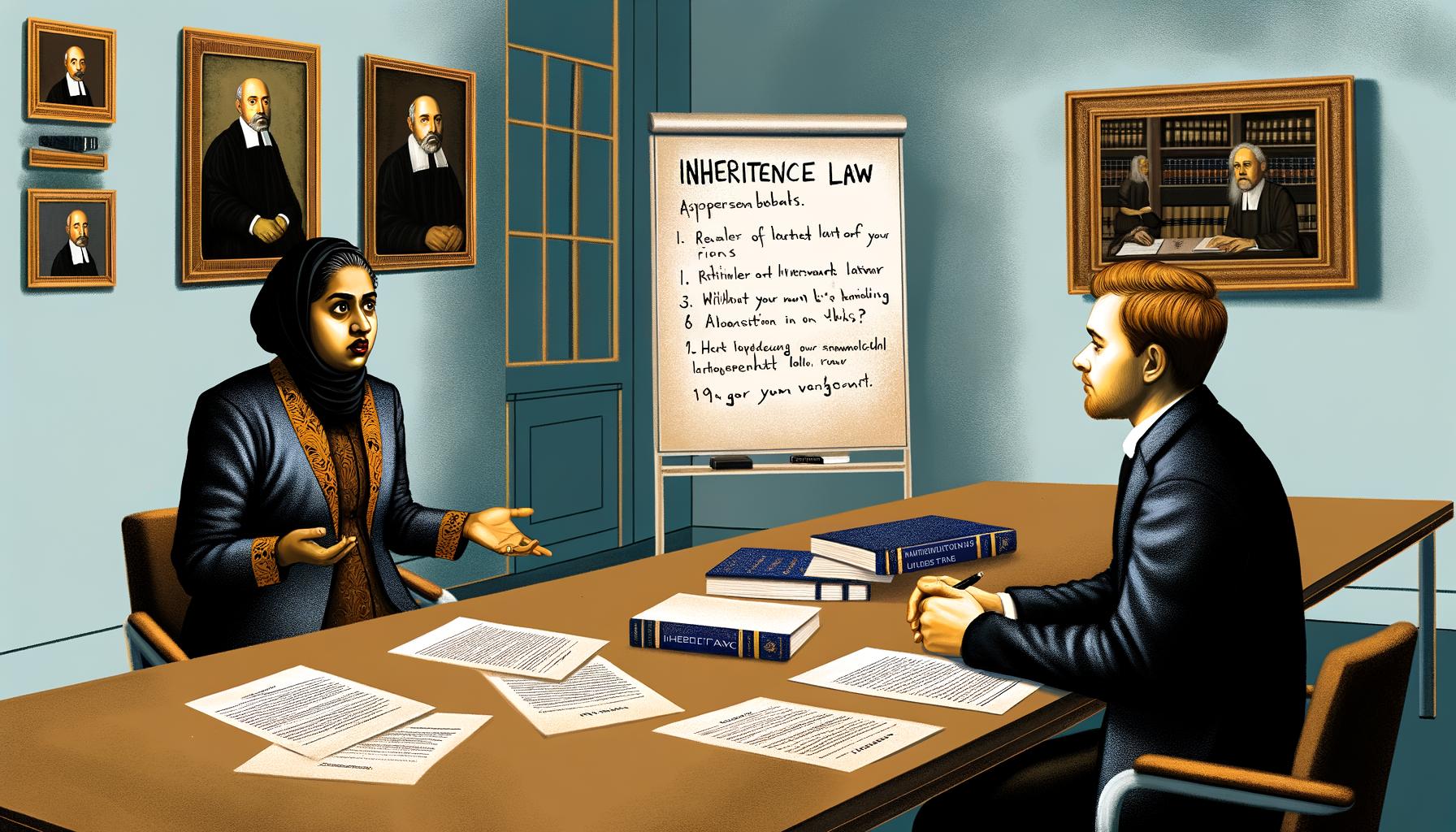Navigating the complexities of inheritance law is crucial for residents of Mission Viejo who wish to ensure their estate is effectively managed and distributed according to their wishes. Inheritance law primarily deals with the legal procedures and documents needed to transfer assets from deceased individuals to their designated beneficiaries. This body of law encompasses aspects such as wills, trusts, probate proceedings, and intestate succession regulations.
Understanding inheritance law in Mission Viejo is particularly important given the unique aspects that might influence estate planning and administration within this community. Situated in the heart of Orange County, Mission Viejo’s local legal framework integrates both state-specific statutes and local ordinances which can play a critical role in how inheritance matters are handled.
Newcomers and long-time residents alike must become familiar with these specificities to navigate inheritance processes smoothly. By understanding key terms, engaging in thorough estate planning, and seeking professional legal assistance when necessary, individuals can avoid common pitfalls and ensure their affairs are settled according to their final wishes. The following sections will delve deeper into various facets of inheritance law as they pertain specifically to Mission Viejo’s residents, providing essential guidance on each step of the process.
Key Terms and Concepts in Inheritance Law
Inheritance law encompasses a variety of terms and legal concepts critical for residents of Mission Viejo to understand. One foundational term is “will,” which is a legal document specifying how a person’s assets should be distributed after their death. Wills enable individuals to designate heirs, appoint executors, and make specific bequests such as leaving family heirlooms to particular relatives. Without a will, the state’s inheritance law governs the distribution of assets according to intestate succession rules.
Another essential term is “trust,” which comes in numerous forms, including living trusts and testamentary trusts. A trust involves three parties: the grantor (who creates the trust), the trustee (who manages the trust), and the beneficiaries (who receive benefits from the trust). Trusts offer advantages such as avoiding probate, providing more control over asset distribution, and potentially offering tax benefits. They can be vital tools for managing substantial inheritances or protecting family wealth.
Probate is another significant concept tied closely with inheritance law. Probate refers to the court-supervised process of settling an estate by validating a will, appointing an executor, paying debts and taxes, and distributing what remains according to the deceased’s wishes or state law if no will exists.
The probate process can be lengthy and complicated, involving multiple legal steps that might overwhelm those not familiar with it. Knowing these terms enables residents of Mission Viejo to better navigate their options when planning their estates.
| Term | Description |
|---|---|
| Will | A legal document specifying asset distribution post-death |
| Trust | Arrangement involving a grantor, trustee, and beneficiaries for managing assets |
| Probate | Court-supervised process of validating wills and distributing estates |
Understanding Wills and Trusts
In understanding the differences between wills and trusts, it is crucial first to define what each term means within the context of inheritance law. A will is a legal document that outlines how a person wishes their assets and estate to be distributed upon their death. It also allows individuals to name guardians for their minor children and specify any last wishes they might have.
On the other hand, a trust is a fiduciary arrangement that permits a third party, or trustee, to hold assets on behalf of beneficiaries. Trusts can be arranged in various ways and can stipulate precisely how and when the assets pass to the beneficiaries.
One significant advantage of having a will is its simplicity and cost-effectiveness. Wills are relatively easy to create and typically involve fewer upfront costs compared to trusts. They allow individuals to clearly state their wishes regarding asset distribution, guardianship, and other critical decisions after they pass away. However, wills inherently involve probate-a potentially lengthy and costly court process where the will is reviewed for validity-before any asset distribution takes place.
Trusts offer several benefits that make them an appealing option despite being more complex than wills.
1. Avoid Probate: One of the most substantial advantages of establishing a trust is avoiding probate altogether.
2. Confidentiality: Unlike wills, which become public during probate, trusts remain private.
3. Flexibility: Trusts allow specific terms on how assets should be managed and distributed under various circumstances.
However, setting up a trust can be more expensive due to legal fees involved in drafting the necessary documents and ongoing management costs if you appoint a professional trustee.
Creating legally binding wills or trusts in Mission Viejo involves specific steps that comply with California’s inheritance law requirements. For example:
– Drafting must meet all state criteria for being validly executed.
– Witnesses must sign off on these documents, confirming that the person creating them (the testator) did so with sound mind and free will.
– Storing these crucial documents securely yet accessibly ensures your wishes are respected without undue delays or complications.

Local legal experts specializing in estate planning can provide valuable guidance through this complex yet vital process; ensuring every aspect aligns correctly with prevailing laws while best serving individual needs authentically reflects one’s final desires accurately where it counts most-home.
The Probate Process in Mission Viejo
The probate process in Mission Viejo is a critical legal procedure for validating and executing a deceased person’s will. When an individual dies, their estate typically must go through probate if they have significant assets. The process starts with the executor named in the will, or if there’s no will, by a court-appointed administrator.
An essential first step is to file a petition for probate with the Orange County Superior Court. This initiates the legal review of the decedent’s estate under inheritance law.
In Mission Viejo, the probate court follows specific steps to ensure all debts are paid and remaining assets are correctly distributed to beneficiaries. After submitting the initial paperwork, including death certification and original will (if available), there is usually a hearing scheduled within 30 days.
During this hearing, the judge either appoints or confirms the executor or administrator and grants them authority over the estate. It’s also crucial during this period to notify all heirs and creditors, allowing them opportunities to contest or file claims against the estate.
Among common challenges during probate in Mission Viejo are creditor claims and beneficiary disputes. Executors must meticulously inventory all assets, appraise their value accurately, manage any debts owed by the deceased, and provide detailed accountings throughout probate proceedings. Disputes can arise if beneficiaries question these appraisals or disagree with decisions about asset distribution made per California’s inheritance law guidelines. Mediators often help resolve such conflicts amicably before they escalate into lengthy legal battles.
| Step | Description |
|---|---|
| Filing Petition | Initial paperwork is filed with Orange County Superior Court. |
| Probate Hearing | A judge appoints or confirms an executor/administrator. |
| Notification Period | All heirs and creditors are informed about the probate. |
| Asset Inventory & Appraisal | Listing and valuation of all on-hand assets. |
Intestate Succession in Mission Viejo
When an individual passes away without leaving behind a will, they are said to have died “intestate.” Intestate succession refers to the legal process by which the deceased’s estate is distributed among their heirs as mandated by law. In the state of California, where Mission Viejo is located, intestate succession laws outline a clear hierarchy for distributing assets based on familial relationships. These laws ensure that the deceased’s property goes to their closest relatives in an orderly manner.
The structure for intestate succession in California involves several tiers of beneficiaries. If the decedent was married at the time of death, their surviving spouse typically inherits all community property and a portion of separate property:
- The surviving spouse receives one-half of any separate property if there is only one child or if parents or siblings also survive.
- If there are two or more children, the surviving spouse gets one-third, while the remaining two-thirds are shared equally among the children.
If no spouse exists, then direct descendants, such as children and grandchildren, inherit the estate equally. The absence of direct descendants sees inheritance passed down to parents and then siblings.
For those residing in Mission Viejo, it’s crucial to acknowledge how these legal provisions impact blended families and non-traditional household structures. Stepchildren and grandchildren through marriage often face exclusions unless legally adopted by the decedent. To navigate these complex scenarios effectively and secure a fair distribution aligned with personal wishes rather than relying strictly on inheritance law provisions, working closely with professionals specializing in estate planning becomes highly advisable.
Furthermore, understanding local intricacies related to real estate properties and other valuable assets prevalent among Mission Viejo residents can provide deeper insights into managing estates successfully under intestate succession circumstances. Local attorneys familiar with regional patterns can provide tailored guidance ensuring compliance while safeguarding family interests comprehensively following statutory guidelines governing inheritance protocols within California framework concerning Mission Viejo jurisdiction specifically.
Tips for Managing Inheritance Disputes
Managing inheritance disputes involves numerous complexities and can be emotionally taxing. Understanding the common causes of these disputes is pivotal in preventing them or resolving them amicably. Frequently, disagreements arise due to ambiguities in the will or trust documents, perceived unfair distribution of assets, or exclusion of certain heirs.
Issues may also occur from challenges to the validity of a will, particularly if there are accusations of undue influence or lack of mental capacity at the time the document was executed. Being aware of these typical triggers helps beneficiaries and executors prepare better to handle potential conflicts.

Strategies for Resolving Conflicts Amicably
One effective strategy for resolving inheritance conflicts is mediation. Mediation involves a neutral third-party mediator who facilitates discussions between disputing parties to reach a mutually acceptable resolution without needing court intervention. This process not only saves time and money but also helps preserve family relationships that might otherwise be strained by prolonged legal battles. Additionally, clear communication and maintaining transparency regarding financial matters can significantly ease tensions among beneficiaries.
Another strategy is carefully drafting estate planning documents to minimize ambiguity and potential conflicts. Working with an experienced attorney specializing in inheritance law ensures that wills and trusts are explicit in their language and reflect clear intentions regarding asset distribution. Including a no-contest clause in the will can also deter dissatisfied beneficiaries from frivolously challenging it, as this clause penalizes individuals who contest the will without valid grounds.
Legal Recourse Available in Mission Viejo
In more contentious cases where amicable resolutions are unattainable, seeking legal recourse becomes necessary. Residents of Mission Viejo can pursue litigation through probate courts to resolve inheritance disputes formally. Filing a petition with the probate court initiates this process, where evidence is presented, and testimonies are heard before a judge makes a ruling based on California’s inheritance law.
Moreover, engaging seasoned legal professionals proficient in Mission Viejo’s specific probate protocols can prove advantageous during litigation. These attorneys offer guidance on navigating complex procedural requirements and provide representation aimed at securing favorable outcomes for their clients. Utilizing their expertise ensures that disputed matters are handled efficiently while ensuring compliance with applicable laws governing estate administration in California.
Inheritance disputes require both delicate handling and an informed approach to achieve satisfactory resolutions for all parties involved. Employing strategic conflict-resolution tactics combined with proper legal support paves the way for smoother transitions during what is often one of life’s most challenging times.
Planning Ahead
Importance of Early Estate Planning
The significance of early estate planning cannot be overstated, especially within the context of inheritance law. For residents of Mission Viejo, undertaking this crucial task well ahead of time ensures that their assets are managed and distributed according to their wishes.
Early estate planning helps mitigate confusion and conflict among heirs, providing clear directives on how assets such as property, investments, and personal belongings should be handled posthumously. More so, it offers the benefactor peace of mind knowing that their financial legacy is secured and safeguarded for future generations.
Tips for Organizing and Preparing Estate Documents
Organizing and preparing estate documents is a multi-step process that requires both attention to detail and a thorough understanding of legal requirements. The first step typically involves inventorying all assets, including real estate, bank accounts, investments, personal property, and any debts or liabilities.
Once the inventory is complete, drafting wills and establishing trusts become essential components in ensuring directives are legally binding. Residents should also consider obtaining life insurance policies to cover any unexpected expenses that may arise after their passing.
Additionally, appointing a reliable executor or trustee who understands your preferences can make a significant difference when it comes to carrying out the terms outlined in your estate plan. Schedule regular reviews of your documents with an experienced attorney specializing in inheritance law to ensure they remain current and reflective of your intentions. It’s not uncommon for laws to change or personal circumstances to evolve over time; therefore, these reviews can help keep everything up-to-date.
Resources Available to Mission Viejo Residents
Fortunately for those residing in Mission Viejo, numerous resources are available to assist with comprehensive estate planning needs. Local legal aid organizations often provide free or low-cost consultations on matters related to inheritance law and estate management. Additionally, reputable financial advisors can offer tailored advice on optimal asset allocation strategies that align with individual goals and minimize tax burdens.
Many estates also benefit from specialized workshops designed to educate participants about key aspects of effective estate planning. These educational events often feature experts from various fields such as law, finance, and healthcare who provide invaluable insights into structuring an airtight estate plan. Furthermore, online platforms offer valuable tools such as templates for wills and trusts which can simplify document preparation significantly.
Engaging with local professional networks not only provides personalized support but also ensures you are aware of any specific nuances pertinent to managing wealth within the jurisdiction of Mission Viejo’s inheritance laws.
Hiring an Inheritance Law Attorney in Mission Viejo
When it comes to navigating the intricacies of inheritance law, hiring an experienced attorney can be invaluable. In Mission Viejo, there are numerous legal professionals who specialize in this field, making it crucial for residents to find the right fit for their specific needs. The first step in choosing an attorney is understanding what qualities and expertise to look for. Essential attributes include a strong background in estate planning, probate law, and familiarity with California’s unique inheritance laws.

A good starting point is seeking referrals from friends, family members, or financial advisors. Personal recommendations can provide insight into an attorney’s skill level and client rapport.
Additionally, researching online reviews and ratings on legal directory websites like Avvo or Martindale-Hubbell can offer unbiased evaluations of various attorneys’ capabilities and service quality. It’s also beneficial to check if potential candidates are members of local bar associations dedicated to estate planning or probate issues as this reflects a commitment to staying updated with current inheritance law trends.
Once you have identified a list of potential attorneys, scheduling an initial consultation is key. This meeting serves multiple purposes: it allows you to gauge your comfort level with the attorney, understand their approach toward your case, and assess their knowledge on specific issues relevant to Mission Viejo residents.
Prepare a list of questions focusing on their experience with local probate courts, familiarity with California’s intestate succession laws, and strategies they recommend for avoiding common inheritance disputes. By taking these steps thoughtfully, you can make an informed decision that will help ensure your estate planning process is both thorough and effective.
Conclusion and Additional Resources
Navigating inheritance law in Mission Viejo can be a complex yet essential task to ensure that your estate and family are protected. From understanding the nuances between wills and trusts to navigating the intricacies of the probate process, it’s clear that thorough knowledge and proper planning are crucial. Many residents may not fully appreciate the importance of these legal instruments until faced with a challenging situation, underscoring the need for early and comprehensive estate planning.
Inheritance law in Mission Viejo has its unique considerations, from how local probate courts function to specific implications of California’s intestate succession laws. By proactively creating a legally binding will or trust tailored to these local regulations, you can prevent potential disputes and ensure your assets are distributed as you intend.
Especially salient is the value of involving an experienced inheritance law attorney who understands Mission Viejo’s specific legal landscape. A knowledgeable attorney can guide you through each step while providing invaluable advice tailored to your unique circumstances.
In conclusion, taking proactive steps now can save significant grief and hassle later on. Adequate preparation involves more than just drafting documents – it requires a comprehensive approach that includes understanding relevant terms, devising strategic plans for asset distribution, and knowing when to seek professional guidance.
For further resources and services tailored specifically for Mission Viejo residents, consulting reputable attorneys or accessing detailed guides on estate planning is highly recommended. Embrace proactive steps today to safeguard your legacy tomorrow by engaging thoroughly with inheritance law principles applicable in Mission Viejo.
Frequently Asked Questions
What Is the Inheritance Law in Us?
Inheritance law in the United States varies by state, but generally encompasses statutes and legal principles that determine how a deceased person’s estate is distributed. Typically, these laws stipulate who is entitled to inherit property and in what proportions.
In the absence of a valid will, a process called intestate succession comes into play, where surviving family members such as spouses, children, and sometimes parents or siblings are given priority for inheritance.
Who Has the Right to Inheritance?
The right to inheritance generally falls to the spouse and children of the deceased first. If there is no surviving spouse or children, other close relatives like parents or siblings may have the right to inherit.
Laws can vary significantly from one state to another; however, many states follow similar principles for determining who the legal heirs are when someone passes away without leaving a valid will.
What Is the Basic Law of Inheritance?
The basic law of inheritance establishes how an individual’s assets are distributed upon their death according to their will or through intestate succession if no will exists. This law aims to honor the wishes of the decedent while also ensuring fair distribution among legitimate heirs. Executors are often appointed through wills to manage and execute these distributions effectively.
What Is the Rule of Inheritance?
The rule of inheritance primarily revolves around either testamentary succession (as outlined in a legally binding will) or intestate succession (when there is no valid will). Testamentary succession respects the explicit wishes of the deceased regarding asset allocation, while intestate rules ensure that close relatives receive portions based on state-determined hierarchies and degrees of kinship.
Who Is Not Allowed to Inherit?
Those not allowed to inherit typically include individuals explicitly disinherited in a valid will due to personal reasons stated by the deceased. Additionally, certain states have “slayer statutes,” which prevent anyone criminally responsible for causing someone’s death from benefiting through inheritance from their victim’s estate. Laws surrounding these restrictions aim to uphold ethical standards within inheritance practices.

